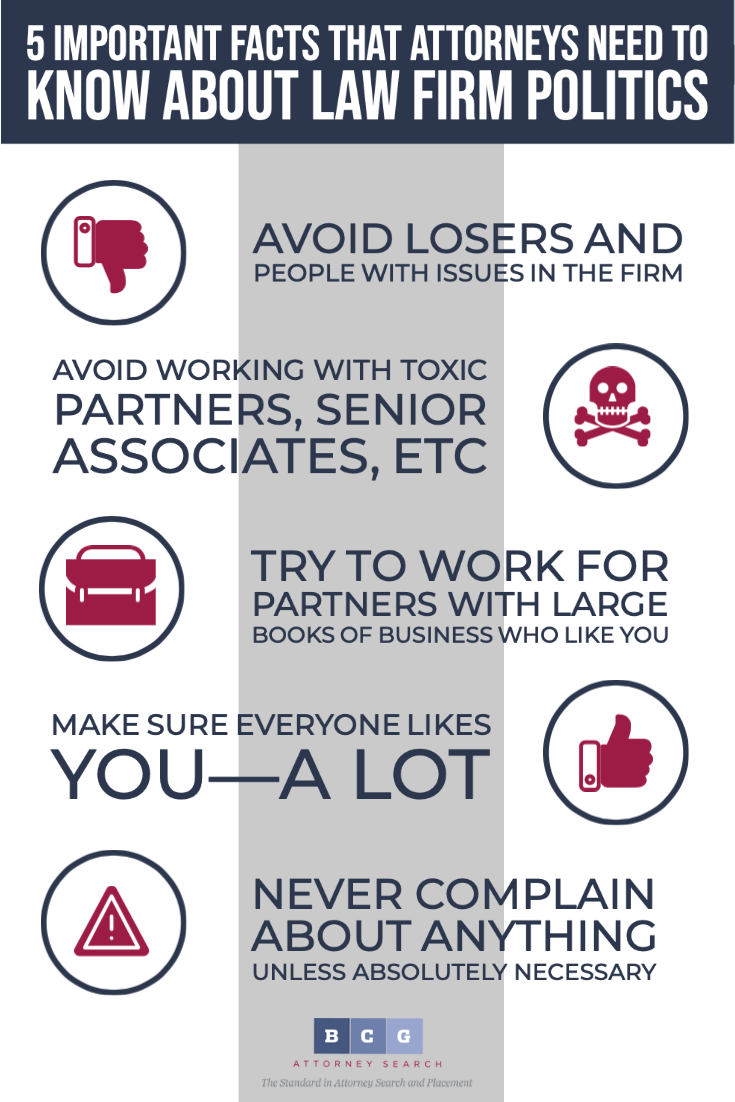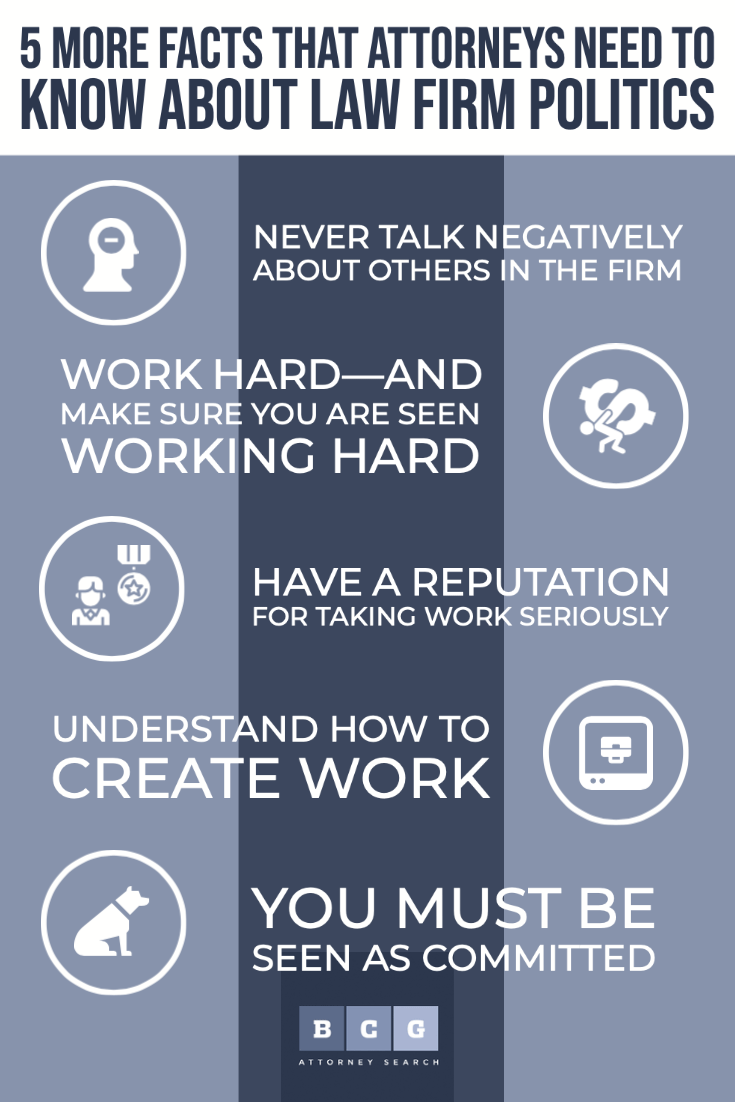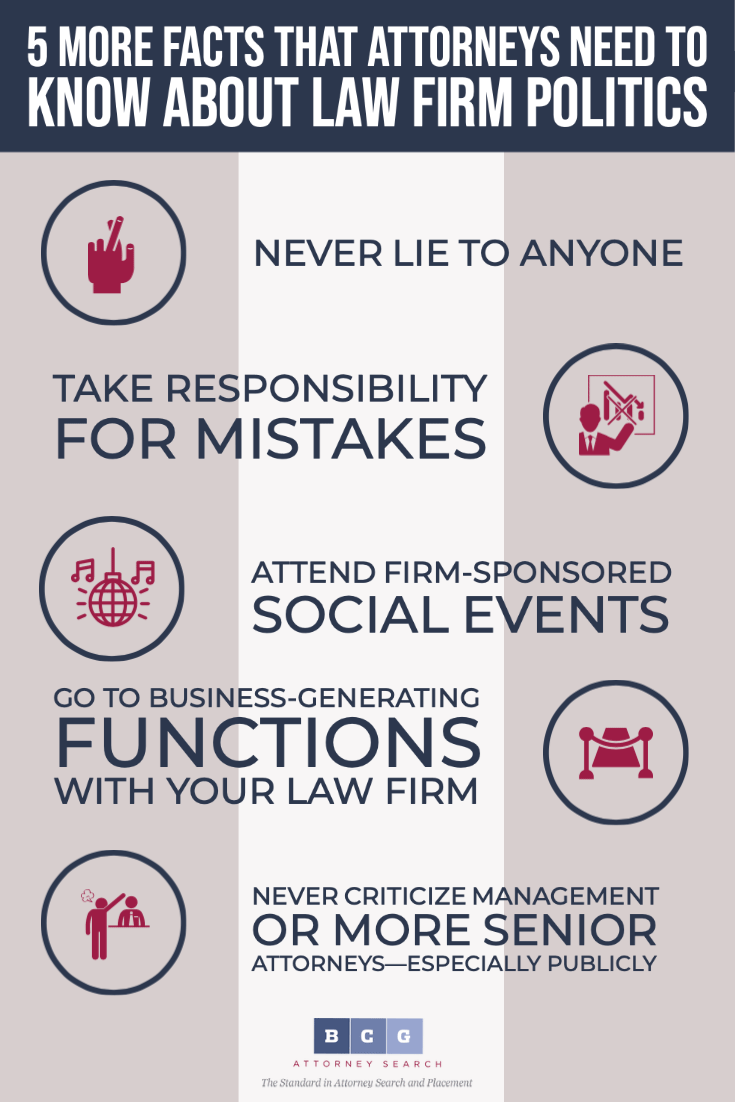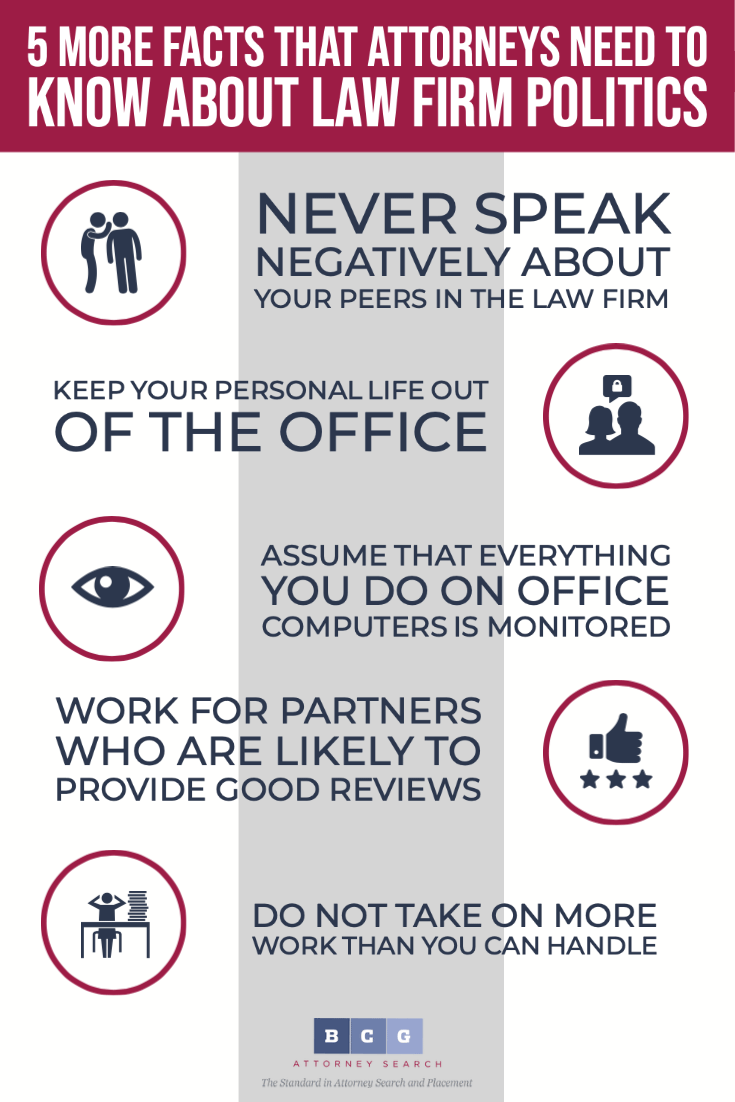Harrison Barnes' Legal Career Advice Podcast - Episode 11
Listen to 25 of the Most Important Facts That Attorneys, Law Students, and Partners Need to Know About Law Firm Politics Podcast
Law firm politics is one of the most difficult and confusing things that attorneys face when practicing law.

Whether you are a partner, associate, or summer associate, there are certain political rules that must be observed inside of law firms if you are going to be successful. Numerous people leave the practice of law because they make political mistakes. These mistakes can also undermine your confidence, drive you out of the law firm world, and create all sorts of issues that may ultimately harm your ability to practice law successfully.

- Avoid Losers and People with Issues in the Firm.
In every firm, there are people with issues. People who are against management, have major problems with their work, create trouble, or are already in trouble. Major law firms have drug addicts, sex addicts, harassers, people who pad their hours, people who lie, people who cheat, people who do bad work, people who are constantly looking for another job, people in trouble with the law, and more. You will find at least one of these people in most law offices.

|
| Harrison Barnes |
You need to avoid bad apples. They are easy to spot and can be enticing to join in with. They need friends and are easy friends to find. These bad apples will expect you to have issues with the firm and share their outlook if you are friends with them.
These sorts of people will influence how you feel about your firm and influence your thoughts and actions. It does not do you any good to associate with them. Powerful attorneys who are coming down on these attorneys will also think negatively of you by association. They will know that your “friend” is sharing negative opinions with you and will assume that you, too, share this negative outlook.
If you associate with these people, it is going to harm you. You will most likely pick up their negative views and begin feeling bad about your job and the firm. It happens in every organization, and it will happen to you.
You want to be seen as positive, hardworking, associating with winners and not losers, someone who is friends with people helping and not hurting the firm, and someone who avoids problem people and does not support them.
You also need to protect your mind and outlook at all costs. Under no circumstances should you allow people to negatively influence you.
- Avoid Working with Toxic Partners, Senior Associates and Others Who Are Likely to Say Bad Things About You
Just as there are associates, summer associates, and partners who are losers and have serious issues, there are also toxic partners. Toxic partners are partners on their way out, who give overly cryptic instructions, reduce other attorneys to crying messes, and have serious personality issues—or partners you simply feel you are better off avoiding.
At the outset, it is important to realize that there is a rule of “thirds” that says:
- One-third of the people you meet will like you.
- One-third of the people you meet will not like you.
- One-third of the people you meet will not care.
If you do not like someone, you should avoid working for them. They will pick up on your feelings and generally not like you back.
If someone does not like you, you should also avoid them—they will find reasons to not like your work and say bad things about you.
It is important to understand that there are also partners who are likely to say bad things about you no matter what you do. They may be angry, be impossible to work with, have communication issues, or just be the sorts of people who make your life miserable. These attorneys may have personality problems that make them unhappy with anyone they work with.
There are attorneys like this in every law firm who are toxic and bad to work with. These attorneys are so toxic that the law firm will often hire unsuspecting laterals to work with no one else but the toxic attorney for a year or so before the beleaguered associates quit, are fired, or generally so demoralized by the experience they leave the practice of law entirely. In other cases, these attorneys simply spread their bad will around to the attorneys who work with them.
The issue of toxic partners is so bad that you need to avoid them at any cost. They often look at associates as less than human and just tools to get work done. These partners are frequently mad. They do not say hello to others in the hall or other pleasantries.
There are also toxic partners who look and play nice, but end up being extremely dangerous. They will give out assignments and act as if the assignment is easy and be very friendly about it—and then when you turn it in, they get extremely weird and become incredibly critical. The same thing has been known to occur with senior associates as well. If someone is overly nice and tells you something is easy, you should expect the opposite. You need to be very careful who you trust.
If you have said something bad about someone, or they think you do not like them, you should be careful about doing work for them as well. They may find reasons to be overly critical of you in return. The key is learning who to avoid working with.
- Try to Work for Partners with Large Books of Business Who Like You
In every law firm, there are partners with large books of business. In most cases, these partners are the ones who have the power to make you partner. Because law firms do not want to lose these partners or their business, law firms will “reward” them by giving their support to attorneys trying to make partner. The law firms will assume that they have enough work to keep you busy at a high billing rate if they make you partner. Law firms will also assume that these partners will show you how to generate more business. If you are a partner, working for partners with business is a good move because they can give you work and keep you busy.
These partners must also like you, of course. If they do not like you, then they will not advance you.
While you are free to work with whomever you want, it is important that you work for the attorneys who have the most power and influence in the firm. If you do not do this, you may have trouble advancing. There is nothing wrong with working with service partners, senior associates, and others—but you need to realize that working in a law firm is somewhat of a popularity contest. Getting close to the right people is something that can help you a great deal. They can help you get good performance reviews and tell you who to avoid, who to impress, and what you need to do to look viable. The right people can be a major help in the popularity contest in law firms.
Finally, if you are close with partners with large books of business, they have the ability to take you with them if there are issues at your existing firm (such as going out of business or experiencing severe problems). Aligning yourself with these partners is always in your best interest. Politically, it may be the smartest thing you can do.
In terms of equity partners in the largest and most profitable law firms, in at least 50 percent of the cases that I can think of, they worked closely with a very powerful partner who supported them becoming a partner. Most long-standing service partners in major American law firms have powerful partners who continually support them with work.
It can be done, of course, but you most often cannot do it alone. You need people supporting you and helping you on your journey—the more powerful and influential, the better.
- Make Sure Everyone Likes You—a Lot
Having a pleasant personality and a reputation for being extremely well-liked is very important.
I recently received a letter from my law school and noticed that the managing partner of one of the largest law firms in the world was on the letterhead. He is also the global head of his firm’s corporate practice group and has a huge roster of clients.
The only thing I remember about this attorney from law school is that he was always smiling, saying hello to people, going out of his way to be extremely nice to everyone, laughing at everyone’s jokes, and brightening up the world around him. I do not remember him being a particularly good student, but I do remember how likable, genuine, and what a nice guy he was. He is now one of the more successful and powerful corporate attorneys out there.
If the secretaries, other attorneys, and everyone else sees you as a likable person, so will your clients. People want to be around those who make them feel good about themselves. People also want to be around others who are happy—especially those who have an infectious happiness. Being seen as likable is something that goes a very long way in your career. Too many people are angry, create problems, and have a lot of negativity. You do not want to be seen as one of these people—instead, be the opposite. The rewards are plentiful:
- If people think positively of you, they will give you work.
- If people think positively of you, they will give you better reviews.
- If people think positively of you, they will warn you of danger.
- If people think positively of you, they will overlook your mistakes more easily.
Having not just the most powerful attorneys, but lower-level attorneys, attorneys at your level, and staff that likes you goes a long way. You want to be liked by as many people as possible.
Another advantage of being liked is that you will set yourself up for future referrals. The attorneys you work with now will go on to different things and may be in a position to refer work to you later on. If they like you now, they will also think positively of you in the future when they have work they can refer to you.
- Never Complain About Anything Unless Absolutely Necessary
Certain people in law firms are always complaining about everything.
I once witnessed one of our recruiters meeting with a junior attorney who was looking for a job because his parking spot was moved—along with every other attorney in the firm.
Attorneys complain, find fault, and get upset about all sorts of non-issues. If you are seen as a constant complainer, people will not like you. And if people do not like you, they will not help you or want to give you work.
In order to advance in a law firm, you should only complain if it is absolutely necessary. Let others do the complaining—if the issues are serious enough, someone else will realize them.
The problem with developing a complainer mentality is that you will always find things to complain about. There are issues to complain about practically every day in most law firms. You can complain about your secretary, benefits, pay, perks, insurance, office furniture, your office size, other attorneys, your spouse, your lack of a spouse, the culture of the firm, the phone system, the IT staff—and more. This sort of complaining just draws negative attention to you and gives you the reputation of being a complainer.
The thing about complainers is that they always seem to start their complaints with statements like: “I do not normally complain…” or “I do not mean to be a complainer, but…” The people who complain the most are usually the ones who always say they do not complain.
Instead of complaining, channel all of the energy that you would ordinarily put into complaining into doing better work and working harder. People will respect you more when they see you do not always complain about things.
In the long run, people will also like you much more if you do not complain when others are complaining all the time. You will be recognized as someone who does not join into complaining, even when others do, and you will be respected for it.
You should put your head down, work hard, and not worry about the petty things that others are worrying about. If no one ever sees you as a complainer or troublemaker, this will go a long way toward building you up in the eyes of others.

- Never Talk Negatively about Others in the Firm
There are tons of opportunities to talk negatively about others in every law firm. There are bad secretaries, people in the mailroom who are problematical and, most of all, other attorneys at all levels (both above and below you) who have issues. None of this should not concern you.
When I was practicing law, there was a very powerful litigation partner who was very good at generating business, doing legal research, and telling people how to look for things—but he absolutely could not write. It was the strangest thing. He would write sentences and simply forget to put words in them. He would also get very close to making an important point in his writing but not make it. It took very talented associates around him to coax out what he meant after reviewing his writing—and what he meant was often brilliant.
At the same time, this partner was extremely sensitive about his poor writing abilities. Associates who worked with him would invariably talk about it, but that would be that. One day an associate who had worked with him exclusively for a few years decided to joke around with the partner’s longtime secretary of over 20 years about the partner’s poor writing ability. It got back to the partner—and when it did, the partner stopped giving this associate work and put the word out to other partners in the firm that they should not work with this associate. The associate literally had nothing to do in the firm until he found a job over a year later. He almost had a nervous breakdown.
If you talk negatively about your superiors, they may turn around and crush you. If you talk negatively about your peers and it gets back to them, they may do everything they can to undermine you and make you look bad. At a minimum, they will make you feel uncomfortable, there will be tension, and you will create enemies. Moreover, people will not trust you with information. If you are not trusted with information, you will suffer from a lack of information. You will be seen as a disloyal person and someone who others need to be on guard with.
If it makes you feel better about yourself to put other people down, gossip, and create issues, by all means go ahead—but know that it will hurt you. People will also believe that you will gossip about them when they are not around.
If a secretary thinks you are gossiping negatively about them, they can destroy you. They will find reasons to get you in trouble. They will point out any indiscretion or mistake you make to your superiors and will wage a slow campaign to undermine you. They will say negative things to other secretaries and enlist them in creating rumors about you. If you are having an affair, look like you are overbilling, make a huge mistake, or stumble in any other way, they will hurt you.
When I was practicing law, I had a great relationship with my secretary. We were doing work for a big client on a huge case. The messenger we sent to do a filing made the mistake of doing a filing for another case in federal court first and then running over to the state court to do my filing. The filing was extremely important, and not getting it done could have been disastrous. The court rejected the filing. The partner I was working for thought she was going to get fired if the client learned about this—she locked herself in her office the entire next day and was being consoled by another partner. I was also worried about getting in trouble.
My secretary told me that she really wanted to help me and would do whatever she could. I am not sure what happened exactly, but she dolled herself up with a lot of makeup, went into the courtroom, and begged and flirted with the court clerk. The court clerk told her he would “backdate” the filing if she agreed to go out with him—and she did. Because of this, we saved a client, and the partner kept her job.
None of this would have happened if I had ever gossiped negatively about my secretary or any other secretary in the firm. Not gossiping and being well-liked are both extremely important for your success in the practice of law. If you do not talk negatively about others—and instead, find reasons to say positive things about them—they will help, not hurt you.
- Work Hard—and Make Sure You Are Seen Working Hard
You need to have the reputation of working hard and billing lots of hours.
Very few people are ever asked to leave a law firm, or get in trouble, for billing too many hours or spending too much time in the office. In contrast, attorneys lose their jobs in law firms all the time for not working enough hours. If you are going to get ahead in a law firm and do well there, you absolutely must have the reputation of working hard and billing lots of hours. This is the name of the game.
A law firm is a business. Because it is a business, it only thrives and makes money when people are billing lots of hours. The people who bill lots of hours are generally considered the biggest contributors to the success of the firm. In most law firms, your ability to bill lots of hours is just as important as the quality of your work. The reason for this is that the people reviewing your performance assume that if you are billing lots of hours, your work must be good—otherwise, clients, senior attorneys, and others would not be giving you work to do.
Politics 101 in most law firms is that you need to bill lots of hours. If you do not bill lots of hours, you will get in trouble. You should bill as many hours as you can within reason. In most cases, if you are billing lots of hours a law firm will leave you alone and assume that everything is fine.
Recently I worked with an attorney who I learned was doing something so egregious that I was completely taken back—and it takes a lot to surprise me after doing this job for so long. The attorney was looking for a position and was getting lots of interviews. After an offer from a major New York law firm, he told me he needed to take his wife to the doctor two days a week and wanted to know if the firm was open to him doing this. To my astonishment, the firm was open to this arrangement, but he was still nervous about accepting the offer. The attorney was a patent litigator with a graduate degree in electrical engineering. According to his resume, prior to working in a law firm he had been an engineer with a big technology company in Silicon Valley. He had gone to law school while still working as an engineer, and he told me the company had paid for his degree.
Something about working with this attorney made me extremely suspicious, and I started to do some due diligence. It did not take me long to discover (from his LinkedIn profile) that he was still employed full time as an engineer while also working as an attorney in a law firm. He was even reachable in the offices of the company for the two days a week when he was supposedly taking his wife to the doctor! Incredibly, the attorney was able to pull this off and had been at his current law firm for five years, never arousing suspicion. He was turning in his time sheets each week—whether they were accurate is another story—and his job was safe. He was able to practice full time as an attorney and also work in a major technology company as an engineer.
Obviously, when I found out what was going on with this attorney, I stopped working with him. He subsequently lost his job in the large law firm and had to suit himself with only having one job—his original position as an engineer.
An attorney holding down a second full-time job while working in a major law firm was something I had never seen before.
The people giving you assignments need to believe that if they give you something to do, you will work hard at it and treat it as the most important thing in the world. This is how partners want to feel about assigning work to associates, and it is how clients want to feel about giving work to partners and others.
In most law firms, other attorneys like seeing you around in the office—a lot. They like the opportunity to stop by your office at all hours and discuss issues with you. They want to feel like you are there to support them, and they can always give you work to do. If you are a junior attorney and not seen in the office consistently, it will be more difficult for you to get work. People will believe that you are not working hard.
When I was practicing law, nearly the entire law firm was there all day Sunday until at least dinner time—every Sunday. Most of these attorneys could easily have done their jobs at home. However, it was important for them to be seen because many partners also came into the office on Sundays. Facetime is important in almost every large law firm. While you can always get certain types of work done at home, being in the office is a form of camaraderie with other attorneys. It shows your commitment and is an important part of office politics.
- Have a Reputation for Taking Work Seriously
In addition to billing lots of hours, you also need to have a reputation for taking your work seriously.
I spoke with a partner recently who let an attorney in his office go because he said that she did not care about her job or the work.
She was competent enough to do the work, but she simply did not care. She could speak with partners and others about the work she was doing and understood everything, but she did not care. She thought that most of what she was working on was dumb and unnecessary.
Attorneys who assign you work want and need to believe that you take everything seriously. Clients who give you work want and need to believe that you take the assignment seriously.
One of the most successful attorneys I know had a reputation for telling potential clients: “If you give me this case I will eat, sleep and breathe it.” And he meant it.
You need to treat every matter you work on as the most important thing in the world—because it is to someone. If clients believe you care more about their matter than they do, they will give you more work. If other attorneys who give you work believe you care more about the matter than they do, they will assign you more work.
Caring about every matter you work on is extremely important to your success as an attorney. You need to be seen as someone who cares and takes matters very seriously.
- Understand How to Create Work
Attorneys also need to know how to create work. Creating work means that you do not just complete assignments, but you also find things to be done. Finding extra work from clients and other attorneys is the nature of the legal business. Doing only what you are told to do is not enough.
In most law firms, there are always people who are able to figure out how to do assignments quickly—without a lot of research, work, and so forth. They take a great deal of pride in this. There are also lots of green associates and others who will often point out that certain types of work are simply not necessary.
Attorneys who do not create work typically do not last long in the legal profession. Attorneys who are able to create work consistently stay busy. You need to find ways to protect your clients, save them money, make them money, and in the process enrich yourself and the firm by billing more hours.
Not too long ago, I was working with an attorney who graduated at the very top of his class from a Top 5 law school. He was working for a major New York law firm, and a junior partner had brought in a big client and gave this young attorney an assignment to do. The young attorney was very smart and quickly realized that the right answer did not require a huge, expensive memo about an unrelated issue, and told the assigning attorney this. He then delved even more into what was going on with the client and told the partner that part of a certain contract involved in the potential litigation could put an end to a potentially long, drawn-out lawsuit. All they had to do was point it out the client.
The junior partner was extremely upset with this. The junior partner was interested in billing lots of hours to the matter—both this client and the big, costly lawsuit were important for this attorney’s standing in the firm. The last thing this junior partner wanted was someone telling them they could not bill a new client millions of dollars on a legal case, even though the solution to their problem was very simple.
The associate ended up getting fired over this incident—if you can believe it. The law firm wanted nothing to do with someone who would not play the game. Not only was he fired but because he had only six months of experience, other law firms were hesitant to hire him and he ended up leaving the practice of law altogether. It was a very sad situation.
The best partners are always finding all sorts of work that they can do for their clients—and this is what keeps them busy. Attorneys at all levels need to find work to be done, and create work when necessary.
- You Must Be Seen as Committed
The attorneys who get ahead are seen as fully committed to the practice of law, working in a law firm, and the firm that employs them.
If you are not seen as committed, then people will avoid giving you work and not want to work with you. A lack of commitment is something that holds many attorneys back and creates serious ongoing issues.
Nothing should detract you from your ongoing commitment. Most attorneys get shaken and leave their firms because they lose their commitment. They lose their commitment due to getting tired, making a mistake, getting frustrated, or believing the grass is greener doing something else. If you start believing that something else is better, you will lose your commitment.
Many attorneys in large law firms tell other attorneys they are interested in going in-house or doing something different with their careers. If you are seen as someone who wants to do something else, then you will not receive the best assignments, get the most hours, or have the most opportunities in your firm. You need to be seen as committed and someone who will not back down.
Commitment is important to how you are viewed by partners if you are an associate, and how you are viewed by clients if you are a partner. Think about who you would want representing you if you had a serious legal issue. Would you want to be represented by someone who has so-so feelings about the work they are doing, or someone who seems extremely committed?

- Never Lie to Anyone
Attorneys will often not tell the truth about matters to avoid getting into trouble. But if you are caught not telling the truth—about anything—the results can be even more disastrous.
I was once working with an attorney who had been fired for what to me seemed like a ridiculous reason. The attorney was close to being made partner, and the law firm planned on electing him within a few weeks. One day he came to work and was asked in passing if he had completed and sent a letter to client. He said that he had. In fact, he had not sent the letter—he had forgotten to do so. He proceeded to immediately write the letter, postdate it, and send it.
Somehow the law firm found out what he had done and was not happy about it. They were able to go into his word processing program and discovered that he had written the letter and sent it a day later. Without hesitation, the law firm fired the attorney immediately. Without a current position and as a senior attorney, he had a near-impossible time finding a new position and was blackballed by his former law firm—all because of a simple lie about something that was harmless.
If you are seen as someone who lies, you will not be trusted and people will not want to work with you.
- Take Responsibility for Mistakes
While attorneys need to look infallible in the eyes of clients, they also need to take responsibility when they make a mistake. Mistakes make you human, and most attorneys are guilty of making mistakes. You should be no different.
- Attend Firm-Sponsored Social Events
Law firms always have various social events. It is important to be seen at these events and socialize with other attorneys at them. Attorneys who do not go to social events hosted by their firm send the message that they are too good to socialize with other attorneys, do not have the confidence to socialize, or that their family and other social interests take precedence. Whether it is a holiday party or another get-together, you should always attend.
As a partner, these events are important because you want to be seen socializing with other attorneys and supporting the firm. As an associate, they are important because you are there to form relationships with peers and partners—and perhaps even get assignments and additional work. Allowing people to see the human side of you can be just as important as showing off your professional side.
Allowing other attorneys to bond with you socially helps to solidify these relationships, often taking them to depths that are difficult to form unless there is a social bond.
- Go to Business-Generating Functions (Pitches) with Your Law Firm
Business-generating functions, especially pitches for new business, are very important from a political standpoint. If you are asked to go out on pitches, you should always do so. Pitches are not only an opportunity to learn—they are also a chance to make new connections and help your firm.
I recently worked with a partner who was asked to go on a pitch and was extremely upset that he had to do so. He flew across the country to assist another partner and was visibly upset and rude to both the partner and the potential client during the pitch. He ultimately ended up losing his job for his behavior. Don’t let this happen to you.
Law firms expect you to show up to pitches, contribute, and do whatever you can to help others. Watching what happens at pitches is a critical part of the learning process. When you are involved in a pitch, you may not receive billable hour credit—however, you are learning what works and what does not. You are also building skills that are likely to help you in the future.
If the pitch is successful, the attorneys you helped may give you some of the work, which will keep you busy. You may even form a relationship with the client during the pitch, realize that there is certain work you are uniquely qualified to do for the client. You will also have the opportunity to be out of the office with other attorneys and form relationships with them. For these reasons, you should go to every pitch that you can.
- Never Criticize Management or More Senior Attorneys—Especially Publicly
You should never criticize the management in your firm. If you feel you have valid criticisms, you need to keep them yourself. Criticizing management publicly puts you on one side of an issue—and if you get on the wrong side of an issue, you are going to lose half the time.
I was once at a meeting in a law firm where a senior associate leading the pro bono committee started rattling off that the firm was the lowest in the city for pro bono hours, that they needed to improve, and that the firm management was not making it a priority. The conference room was filled with a few partner members of the management committee, a class of summer associates, and a bunch of associates. The senior associate seemed genuinely concerned and went on a diatribe for at least five minutes criticizing management for this. I was surprised but just figured he was enthusiastic about pro bono work. The members of management in the meeting looked very upset because they were embarrassed—it was a major New York law firm, and they did not want to look bad in front of a group of summer associates and others.
Over the next several weeks, I noticed that the senior associate who had led the charge was getting berated and having his work seriously criticized by partners in the firm. These attacks were quite public. In particular, I noticed when one of the partners raised his voice as he criticized (for several minutes) some work that the senior associate had done. Rather quickly, the senior associate who had been so critical started to look more and more visibly upset and less and less put together. Attacking management was a huge mistake—he had no power and severely damaged his career by doing so.
I have so many stories about how I have seen public criticism backfire for attorneys inside of law firms. I once saw a junior associate call a reporter and criticize partners from his firm about the way they were handling a case. This attorney, of course, did not last long at the firm.
I saw another associate who was cut off completely and never given any work because he said bad things about a partner behind his back, and the partner found out about it. You should never criticize partners or anyone else in the firm. If you talk negatively about others behind their back or even think negatively about others, even if it does not get back to them they will sense your negative opinions of them. My father used to work for the CIA, and early in his career someone told him: “If you think it, you will show it.” You should never talk negatively about attorneys with power over you—because if you do, you will show it.

- Never Speak Negatively About Your Peers in the Law Firm
If you speak negatively about your peers, it is likely to get back to them. Even if it does not get back to the subject of the criticism, the people you are complaining to will know that they cannot trust you. They will assume you will speak negatively about them if you get a chance. People do not trust those who speak negatively about others.
If your peers find out that you said negative things about them, they are very likely to do what they can to get back at you in the future—this is human nature. Why would you possibly want to create enemies? It is not worth it.
- Keep Your Personal Life Out of the Office
Involving your personal life in the office is a huge mistake. You should never—under any circumstance—give people a reason to speak negatively of you. Your personal life and the details surrounding it may give people reasons to dislike you or find fault with you. You do not want to give anyone that opportunity.
Early in my career, I worked with a woman who lost her job and suddenly found herself frozen out of work after sharing some details of her personal life with a partner she worked with. She had met a man briefly in an airport, exchanged phone numbers, and invited him to visit and stay with her a few weeks later. She shared with the partner that she had sex with him all weekend. She realized that after she told the partner this that that the partner stopped giving her work and treated her with disgust. Apparently the partner had strong convictions that this sort of behavior was wrong and did not like her after hearing this story.
You need to do what you can to keep your personal life out of the office. People get fired for openly broadcasting fights with their spouses or any other personal drama that has no place in any law office.
One of the easiest ways that people get into trouble at work is dating colleagues. This almost never ends well—for either party. When people hook up and then uncouple, they can almost never work together again. Feelings get in the way of getting things done and make it uncomfortable for everyone.
I recently saw a partner with a huge $10+ million book of business lose his job in a major law firm after it was revealed publicly that he had a relationship with an attorney who was not a partner. This was considered bad judgment because although it was 100% consensual, he was this woman’s superior. The affair came to light two years after it was over when the woman had her attorney contact the firm, and the firm agreed to pay out a huge settlement. The partner was never able to find another job.
Your personal life has no business in the office. While you are entitled to be human, you want to be known for your work and professionalism—not the drama in your personal life.
- Assume That Everything You Do on Office Computers and Phone Is Monitored
Be on the safe side—you should always assume that your law firm is listening to your conversations and recording your screen activity.
I know of one attorney who was on the phone with one of his friends, with the door closed, joking about starting a porn site, but the conversation actually sounded serious. A few weeks later, he was fired from his job with no explanation.
I also know of an attorney who was fired from an AmLaw 10 firm for posting a negative comment about the firm on an online news tabloid for attorneys. The law firm had been recording his screen. When the comment came up and they wanted to see who wrote it, they simply checked the activity history for each of their associates and saw everything he had done on his screen. The firm quickly told him that he was being fired for his comment.
I was once working with a group of partners in a major law firm that was planning on moving to another law firm. They were communicating at work using their personal emails on their work computers. A few days before they were scheduled to leave, the law firm confronted them with the news that they knew what they were doing because they were recording their screens.
Most law firms are not this paranoid or crazy, but in each instance above, the law firm was simply protecting itself. On a more serious level, they want to protect themselves from insider trading and make sure that their attorneys are behaving properly. Whatever the reason, never type or say anything that you would not want made public.
- Work for Partners Who Are Likely to Provide Good Reviews
You should always work for partners who are likely to give you the best reviews. There are certain partners who have a reputation for giving people a hard time, never being satisfied, even “ruining people.” You want to avoid these partners at all costs and stay away from them because they can hurt you. Instead, work for the partners who have a reputation for helping people—not hurting them.
If you do work with partners with a bad reputation, make sure you cover your back, work hard, and do not make any mistakes.
- Do Not Take on More Work Than You Can Handle
It is important to learn how to turn down work if you are already very busy. People may act upset if you turn down work—however, they will be even more upset if you miss deadlines, do a bad job, and disappoint them. You always need to balance the objectives of doing a good job on a project versus making mistakes and doing sloppy work. Sometimes it is best to turn the work down if you cannot do it well.
Attorneys who never turn down work also often end up burning out. We are all human and need time to exercise, relax, and recharge. Turning down work may be the only option that allows you to do this.
Cooler heads generally prevail. To last a long time in a law firm and be successful, you need to balance turning down work with your own sanity and ability to practice over the long term. While billing hours is important, one serious mistake or blown deadline can often cost you your job.
- Do Not Require Too Much Handholding When Doing Assignments
Attorneys are paid to figure stuff out. While senior attorneys may understand things better than you do, constantly asking for direction and feedback on assignments is likely to annoy them and not make them want to work with you in the future. When you get an assignment, it is important to ask a lot of questions up front to understand exactly what is needed. After that, get the assignment done with as little input from higher-ups as possible.
- Keep Your Appearance Up and People Will Notice
There are numerous studies that show how you dress and how you look have a direct impact on the income you earn. If you let yourself go, this will hurt you. In today’s professional world, grooming and so forth are extremely important.
Every attorney is a product. Because you are a product, you need to play the part. A product is defined by how it looks, acts, and functions. There are plenty of dumpy attorneys out there who are very good but and let themselves go. But you are going to be far better off if you keep yourself up than if you do not. This means grooming, watching your wardrobe, and looking as professional as possible.
Early in my career, the highest-paid attorney in the law firm where I was working told a group of attorneys that when he walked into a room with a client, he needed to look like the most put together, competent, and highest-performing person in the room. Clients are paying you to look and act the part to the extent you can.
- Understand the Politics of Working in a Branch Office
It is more difficult to make partner, advance, and stay employed in branch offices. In the Los Angeles offices of some New York law firms, an attorney has never been made partner in the entire 20+ years that the law firms have had offices in Los Angeles. Partners in branch offices are dependent on attorneys in the main office for work and introductions as well.
If you are going to succeed in a branch office, you will often need to do your best to form relationships and get work from partners in the main office of the firm. Attorneys in the main office can advance you and protect you by giving you work. Ideally, you should form relationships with the most powerful partners in the main office of your firm.
If you are out of sight, you are out of mind. Attorneys in branch offices are not as visible when work is handed out, or when advancement decisions are made. They are also not as visible when decisions are being made about things such as letting attorneys go—it is far easier to let someone go who you never see than someone who you see and interact with on a regular basis.
From a political standpoint, if you are working in a branch office, you should do your best to travel to and interact with attorneys in the main office regularly. They want to feel that you are their advocate and supporting them on the ground in another city. The most visible and trusted people in branch offices are the ones who advance. You can learn more about threats to your survival as well as advancement opportunities if you travel to the main office of your firm regularly.
- Turn in Quality Work the First Time
Attorneys will often do “drafts” of work that are littered with typos, not fact-checked, and have all sorts of problems. While this sort of work can be corrected later, a lack of attention to detail—even in drafts—can very quickly give you a bad reputation within your firm. The term “draft” means that the product could go out the door but could also be improved with more thought, tightening up the language, and some additional editing. “Draft” does not mean that there are glaring errors or typos in whatever you turn in. Attorneys take bad work product personally, even as a sign of disrespect. Clients assume that if you make typos in your work product, there are likely to be errors with your logic or thinking process as well. You always need to do the best work you can and turn in quality work that can be easily improved later.
- You Should Be Available (and Preferably Working) on Weekends and Holidays
A lawyer is a billing machine. Other attorneys like to see you billing because when you are, they are making money. If you are not billing, they are losing money. That is the psychology of a law firm.
You should also understand that being an attorney is much like being a doctor. Clients have emergencies on weekends and holidays, and you need to be available to address them when they happen. The best doctors and attorneys never take a day off—and if they do, they are always reachable.
About Harrison Barnes
Harrison Barnes is a prominent figure in the legal placement industry, known for his expertise in attorney placements and his extensive knowledge of the legal profession.
With over 25 years of experience, he has established himself as a leading voice in the field and has helped thousands of lawyers and law students find their ideal career paths.
Barnes is a former federal law clerk and associate at Quinn Emanuel and a graduate of the University of Chicago College and the University of Virginia Law School. He was a Rhodes Scholar Finalist at the University of Chicago and a member of the University of Virginia Law Review. Early in his legal career, he enrolled in Stanford Business School but dropped out because he missed legal recruiting too much.
Barnes' approach to the legal industry is rooted in his commitment to helping lawyers achieve their full potential. He believes that the key to success in the legal profession is to be proactive, persistent, and disciplined in one's approach to work and life. He encourages lawyers to take ownership of their careers and to focus on developing their skills and expertise in a way that aligns with their passions and interests.
One of how Barnes provides support to lawyers is through his writing. On his blog, HarrisonBarnes.com, and BCGSearch.com, he regularly shares his insights and advice on a range of topics related to the legal profession. Through his writing, he aims to empower lawyers to control their careers and make informed decisions about their professional development.
One of Barnes's fundamental philosophies in his writing is the importance of networking. He believes that networking is a critical component of career success and that it is essential for lawyers to establish relationships with others in their field. He encourages lawyers to attend events, join organizations, and connect with others in the legal community to build their professional networks.
Another central theme in Barnes' writing is the importance of personal and professional development. He believes that lawyers should continuously strive to improve themselves and develop their skills to succeed in their careers. He encourages lawyers to pursue ongoing education and training actively, read widely, and seek new opportunities for growth and development.
In addition to his work in the legal industry, Barnes is also a fitness and lifestyle enthusiast. He sees fitness and wellness as integral to his personal and professional development and encourages others to adopt a similar mindset. He starts his day at 4:00 am and dedicates several daily hours to running, weightlifting, and pursuing spiritual disciplines.
Finally, Barnes is a strong advocate for community service and giving back. He volunteers for the University of Chicago, where he is the former area chair of Los Angeles for the University of Chicago Admissions Office. He also serves as the President of the Young Presidents Organization's Century City Los Angeles Chapter, where he works to support and connect young business leaders.
In conclusion, Harrison Barnes is a visionary legal industry leader committed to helping lawyers achieve their full potential. Through his work at BCG Attorney Search, writing, and community involvement, he empowers lawyers to take control of their careers, develop their skills continuously, and lead fulfilling and successful lives. His philosophy of being proactive, persistent, and disciplined, combined with his focus on personal and professional development, makes him a valuable resource for anyone looking to succeed in the legal profession.
About BCG Attorney Search
BCG Attorney Search matches attorneys and law firms with unparalleled expertise and drive, while achieving results. Known globally for its success in locating and placing attorneys in law firms of all sizes, BCG Attorney Search has placed thousands of attorneys in law firms in thousands of different law firms around the country. Unlike other legal placement firms, BCG Attorney Search brings massive resources of over 150 employees to its placement efforts locating positions and opportunities its competitors simply cannot. Every legal recruiter at BCG Attorney Search is a former successful attorney who attended a top law school, worked in top law firms and brought massive drive and commitment to their work. BCG Attorney Search legal recruiters take your legal career seriously and understand attorneys. For more information, please visit www.BCGSearch.com.
Harrison Barnes does a weekly free webinar with live Q&A for attorneys and law students each Wednesday at 10:00 am PST. You can attend anonymously and ask questions about your career, this article, or any other legal career-related topics. You can sign up for the weekly webinar here: Register on Zoom
Harrison also does a weekly free webinar with live Q&A for law firms, companies, and others who hire attorneys each Wednesday at 10:00 am PST. You can sign up for the weekly webinar here: Register on Zoom
You can browse a list of past webinars here: Webinar Replays
You can also listen to Harrison Barnes Podcasts here: Attorney Career Advice Podcasts
You can also read Harrison Barnes' articles and books here: Harrison's Perspectives
Harrison Barnes is the legal profession's mentor and may be the only person in your legal career who will tell you why you are not reaching your full potential and what you really need to do to grow as an attorney--regardless of how much it hurts. If you prefer truth to stagnation, growth to comfort, and actionable ideas instead of fluffy concepts, you and Harrison will get along just fine. If, however, you want to stay where you are, talk about your past successes, and feel comfortable, Harrison is not for you.
Truly great mentors are like parents, doctors, therapists, spiritual figures, and others because in order to help you they need to expose you to pain and expose your weaknesses. But suppose you act on the advice and pain created by a mentor. In that case, you will become better: a better attorney, better employees, a better boss, know where you are going, and appreciate where you have been--you will hopefully also become a happier and better person. As you learn from Harrison, he hopes he will become your mentor.
To read more career and life advice articles visit Harrison's personal blog.













